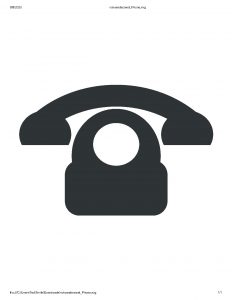On March 17, 2020, the Social Security Administration, like many of our country’s businesses, closed its offices in response to the COVID-19 Pandemic. The closing of the Social Security offices included not just the 1,230 field offices in the nation, but also the 169 hearing offices. The motivation behind the closing was to protect the people who Social Security serves and the Social Security employees. Even though the offices remain closed, Social Security employees are working remotely (from their homes). With the use of phones and the internet, Social Security continues to provide services to the public. Without the daily “people traffic” the Social Security offices are beginning to catch up with the daily backlog. It is still difficult for some who interact with Social Security, particularly the disabled, to use the internet.
Many disabled people do not have internet. If they have internet, often the internet is not quick. Others who have internet find that their only connection is through a smart phone or tablet instead of a computer. While Social Security’s website works well, it is very difficult to use it effectively on a phone rather than a computer. An alternative to connecting to the internet through a phone is to use a computer at a library. Using a library computer has the disadvantage of being, well, public. There are people around you who may read what is on your screen. There are also considerations of how to secure private information while being on-line. Finally, there are concerns of printing document receipts to prove that a submission to Social Security occurred. On top of these are the issues of transportation to the nearest public library, the library’s hours of operations, the immediate availability of computers and the basic knowledge of how to operate a computer.
Calling Social Security is sometimes the best option. The advantages of calling the Social Security office include less wait time and knowledge of your case. The wait time to speak with a representative is less now than before the COVID-19 Pandemic shutdown. The person at the local Social Security office can look at your on-line file and immediately answer the questions.
Which is the best number to call when trying to speak to a person at Social Security? Social Security advertises its national toll-free number, 800 772-1231 as the number to call for help. Most times, however, the best place to call is the Social Security office closest to you. Social Security trained the people working at the local Social Security office. They can access your Social Security file on-line. Almost always, these people can answer questions about the status of your case. How do you find this number?
 TIP: on a smart phone or computer, search for “Social Security Office Locator.” A site will appear with the option to enter your zip code. Do that and then push the “Locate” button. The closest Social Security office will appear along with its phone number.
TIP: on a smart phone or computer, search for “Social Security Office Locator.” A site will appear with the option to enter your zip code. Do that and then push the “Locate” button. The closest Social Security office will appear along with its phone number.
Local Social Security offices are not the only offices effected by the COVID-19 Pandemic. The Healing Offices are closed to the public. As a result, there are no hearings being held before administrative law judges by “face-to-face” hearings or by video hearings. Social Security offers an alternative to face-to-face or video hearings by offering a “phone hearing.” What is a phone hearing?
Phone Hearings. As the name implies, a phone hearing takes place on a phone. There is no video. The administrative law judge cannot see you. You cannot see the judge or any other witnesses who testifies. Everyone can hear the other (assuming that there is a good phone connection). The hearing begins with a phone call from the hearing monitor to the claimant, the claimant’s representative, and the vocational expert. The judge will already be on the line. Once all the persons are on the line, the judge begins with preliminary matters: the persons on the phone line must be alone and in a quiet room. The judge announces that no person, other than the judge, records the hearing. The judge places all persons testifying under oath. The claimant must agree, on the record, to a hearing by phone. The judge always wants to know whether all evidence is in the record. Then the judge asks the claimant questions. The questions are like the questions asked during a live or video hearing. The claimant’s representative asks questions. Then the judge and the claimant’s representative question the vocational expert. At the conclusion of the testimony of the vocational expert, the hearing is over. The judge “takes the matter under advisement.” Rarely does the judge inform the claimant that the claimant won the case. The judge never tells the claimant, at the conclusion of the hearing that the claimant lost the hearing. At a later point, the judge sends a written decision to the claimant and the claimant’s representative.
The administrative law judge cannot see you. You cannot see the judge or any other witnesses who testifies. Everyone can hear the other (assuming that there is a good phone connection). The hearing begins with a phone call from the hearing monitor to the claimant, the claimant’s representative, and the vocational expert. The judge will already be on the line. Once all the persons are on the line, the judge begins with preliminary matters: the persons on the phone line must be alone and in a quiet room. The judge announces that no person, other than the judge, records the hearing. The judge places all persons testifying under oath. The claimant must agree, on the record, to a hearing by phone. The judge always wants to know whether all evidence is in the record. Then the judge asks the claimant questions. The questions are like the questions asked during a live or video hearing. The claimant’s representative asks questions. Then the judge and the claimant’s representative question the vocational expert. At the conclusion of the testimony of the vocational expert, the hearing is over. The judge “takes the matter under advisement.” Rarely does the judge inform the claimant that the claimant won the case. The judge never tells the claimant, at the conclusion of the hearing that the claimant lost the hearing. At a later point, the judge sends a written decision to the claimant and the claimant’s representative.
Should a claimant agree to a phone hearing or wait until the hearing offices are open to have a live or video hearing before the judge? There are advantages to a phone hearing: the hearing is now instead of at some unknown future date; there is no travel to the hearing; the decision will come sooner than during pre-COVID-19 Pandemic days because fewer people are agreeing to have phone hearings; and the possibility of an award of benefits now. There are also drawbacks to a phone hearing: no visual contact with the judge; phone connections are not always the best; there is no way to have the judge make an assessment of the manner, appearance and conduct of the claimant during the hearing. It is interesting to note that Social Security prefers hearings to be live or by video rather than by phone. Only in extraordinary circumstances are phone hearings allowed.
Opting for a phone hearing is an important decision. Consult with your representative before deciding to agree to a phone hearing.
Stay safe!
 Indiana Social Security Disability Attorney Blog
Indiana Social Security Disability Attorney Blog









